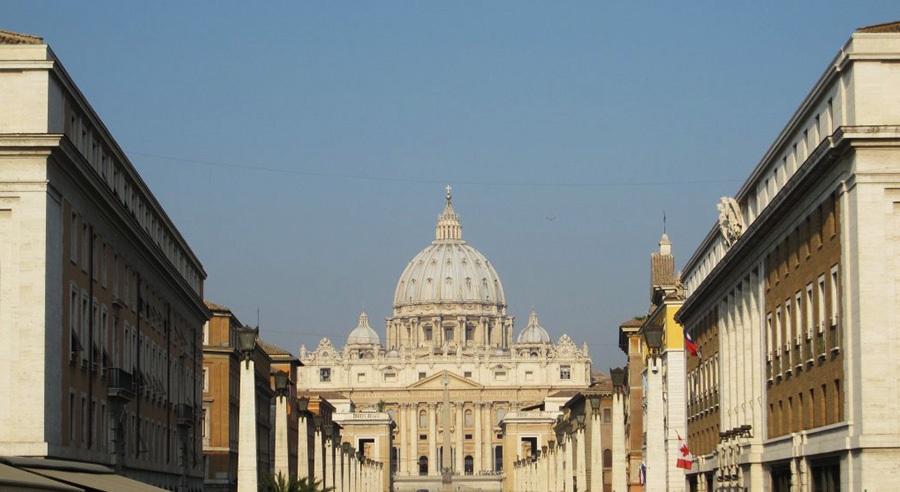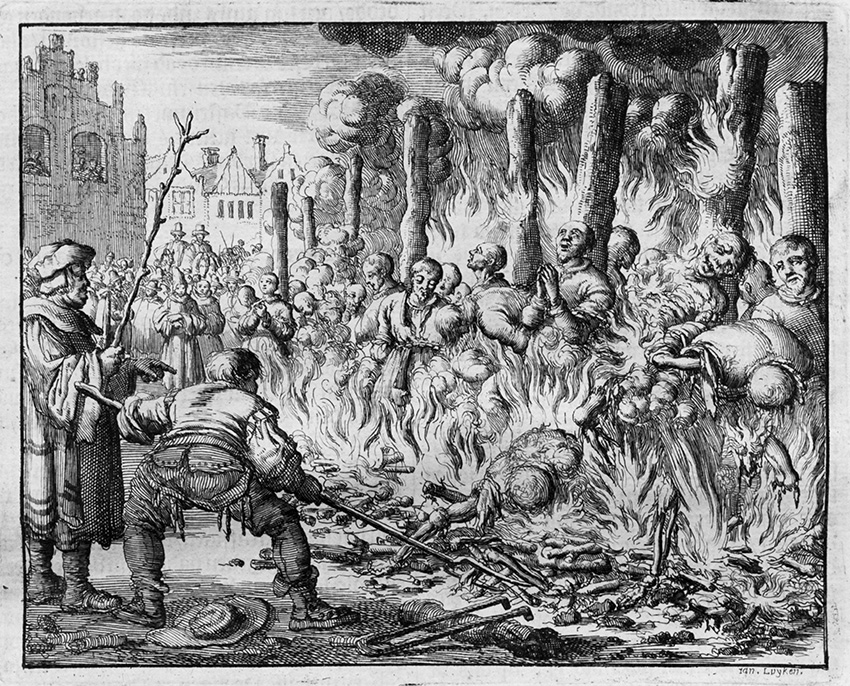CHRISTIAN TOTALITARIANISM
Whoever sacrifices to any god other than the Lord must be destroyed. Exodus 22:20


In the year 395 the western world changed forever. At the request of Church leaders, the Roman state unleashed a totalitarian reign of terror unlike anything the ancient world had ever seen. Laws were passed that enshrined Christianity as the official and sole religion of the Roman Empire. All other religions were outlawed and practitioners of them were killed or severely persecuted. Pagan temples were torn down by both temporal authorities and mobs incited by Christian officials. Pagan priests were killed by mob violence, and storehouses of ancient knowledge, such as the library in Alexandria, were destroyed.
This reign of terror was not just directed against pagans. It was also directed in a very specific manner against non-Catholic Christian factions and the Jews. Indeed, this was the beginning of anti-Semitism as an ideology.
It is very important to understand that Christian totalitarianism did not arise randomly or spontaneously. The campaign for absolute total and complete power was based on very specific verses from the Bible. (See our report.) It was a system of persecution that created a large body of Church law (Canon Law) and secular laws, as well as highly sophisticated systems of intellectual thought, such as St. Augustine's complex system of philosophy. Indeed, it was Augustine who first used the chilling phrase "compel them to come in" in an ideological context.
It is also important to note that this totalitarian reign of terror in religion was a very new event in history. Contrary to the claims of many Christian historians the pagan world was a relatively tolerant place. The "persecutions" of the church by the pagans were very mild affairs except for the one organized by Diocletian.
Within this historical context, the organization of the "Holy War" of the Crusades and the Papal Inquisition in 1232 were not isolated events. They represented a logical and rational extension of the religious system created in Europe in the fourth and fifth centuries.
Protestantism, although it split from the Catholic Church, continued the Christian authoritarian tradition. Martin Luther, for example, is often held up as a champion of religious freedom. Yet few remember Luther's argument that "It is a duty to suppress the Pope by force" or how he encouraged the persecution of Anabaptists and other Protestant sects. Martin Luther was no friend of democracy either, calling upon German nobles to "smite, slay, and stab" peasants who rebelled against aristocratic oppression in the 1530s. Martin Luther consistently maintained that state power and religious authority should be closely linked (see our page on Martin Luther and Religious Persecution).
Some Protestant sects later carried authoritarianism to the New World in the seventeenth and eighteenth centuries. Although many fled England because of religious persecution, it is important to realize that some did not object at all to the idea of persecution. The "freedom" they sought in America was "freedom" from the persecution of their specific sect by other Christian factions such as the official church of England. It did not include "freedom" for people under their political control. Indeed, when the Puritans briefly gained power in the British Civil War they proved even less tolerant of dissent than the regime of Charles I. New England Puritan leaders like John Winthrop argued that democracy was one of "the meanest and worst of all forms of government". He and his contemporaries sought instead to create a Christian "city upon a hill" in the New World. In this "New Jerusalem" dissidents were not tolerated, and things eventually degenerated to the point that an American version of Europe's extensive witch trials system was even put into action. The Puritan "revolution" in England turned into a total failure and was replaced by the Restoration. In America the Puritans also went into decline and ceased to exist as a major denomination in the 19th century.
The desire of some Protestant sects like the Puritans to combine religious and political authority, thereby creating an explicitly Christian government, alarmed Founding Fathers like Thomas Jefferson. Jefferson argued: "In every country and in every age, the priest has been hostile to liberty. He is always in alliance with the despot, abetting his abuses in return for protection to his own". To Jefferson the authoritarian history of Christianity made it clear that liberty and democracy could only exist if religion remained separate from politics.
In ancient Rome the adoption of a totalitarian form of Christianity set in motion a series of disasters. In a mere few years Rome would be sacked by German tribes led by Christian leader, Alaric. Eventually, the Roman Empire in the west collapsed. What did not collapse was the religious reign of terror which ran right up to the 18th century in many states.
Here are our reports on this subject.
CHRISTIAN TOTALITARIANISM AND ANTI-SEMITISM
ANCIENT AND MEDIEVAL WORLD
Christian Persecution of Pagans in Ancient Rome
Christian Persecution of Jews in Ancient Rome
Medieval Christian Totalitarianism and Antisemitism
The Evil of Antisemitism: A Reading List
St. Bartholomew's Day Massacre
LUTHER'S AUTHORITARIANISM AND ANTI-SEMITISM
Martin Luther: Protestant Antisemitism and Religious Persecution
ANTISEMITISM IN EASTERN EUROPE
Antisemitism in Imperial Russia
Antisemitism in Interwar Poland
CRITICAL COMMENTARY ON CHRISTIANITY
Critical Commentary on Christianity
Lack of Historical Evidence for Jesus
RELIGIOUS INTOLERANCE IN AMERICA
THE DARK SIDE OF THE PURITANS OF NEW ENGLAND
Thomas Jefferson on Religious Freedom and Puritans
CHRISTIANITY AND SLAVERY
Christianity's Role in Supporting Slavery
RELIGIOUS PROBLEMS IN MODERN AMERICA
Religious Problems in Today's America
Notes
[1] According to Edward Gibbon, "Allotting the same proportion to the provinces of Italy, Africa, and perhaps Spain, where, at the end of two or three years, the rigour of the penal laws was either suspended or abolished, the multitude of Christians in the Roman empire, on whom a capital punishment was inflicted by a judicial sentence, will be reduced to somewhat less than two thousand persons. Since it cannot be doubted that the Christians were more numerous, and their enemies more exasperated, in the time of Diocletian than they had ever been in any former persecution, this probable and moderate computation may teach us to estimate the number of primitive saints and martyrs who sacrificed their lives for the important purpose of introducing Christianity into the world."
[2] Augustine's doctrine of compulsion was based on a statement of generosity by Jesus Christ recounted in Luke 14:13-24
"But when thou makest a feast, call the poor, the maimed, the lame, the
blind:
And thou shalt be blessed; for they cannot recompense thee: for thou shalt be
recompensed at the resurrection of the just.
And when one of them that sat at meat with him heard these things, he said unto
him, Blessed is he that shall eat bread in the kingdom of God.
Then said he unto him, A certain man made a great supper, and bade many:
And sent his servant at supper time to say to them that were bidden, Come; for
all things are now ready.
And they all with one consent began to make excuse. The first said unto him, I
have bought a piece of ground, and I must needs go and see it: I pray thee have
me excused.
And another said, I have bought five yoke of oxen, and I go to prove them: I
pray thee have me excused.
And another said, I have married a wife, and therefore I cannot come.
So that servant came, and shewed his lord these things. Then the master of the
house being angry said to his servant, Go out quickly into the streets and lanes
of the city, and bring in hither the poor, and the maimed, and the halt, and
the blind.
And the servant said, Lord, it is done as thou hast commanded, and yet there is
room.
And the lord said unto the servant, Go out into the highways and hedges, and
compel them to come in, that my house may be filled."
Source: Luke 14:13-24, The Holy Bible, King James Version
NOTE: A BRIEF STATEMENT OF PUBLICATIONS PRINCIPLES
The World Future Fund serves as a source of documentary material, reading lists, and internet links from different points of view that we believe have historical significance. The publication of this material is in no way whatsoever an endorsement of these viewpoints by the World Future Fund, unless explicitly stated by us. As our web site makes very clear, we are totally opposed to ideas such as racism, religious intolerance, and communism. However, in order to combat such evils, it is necessary to understand them by means of the study of key documentary material. For a more detailed statement of our publications standards click here.